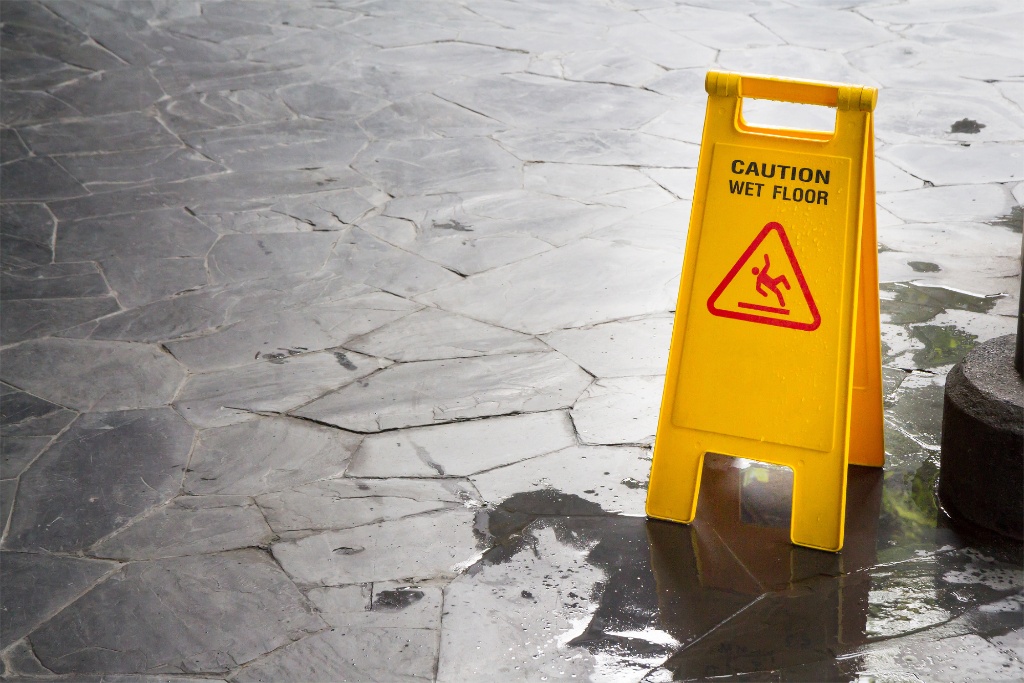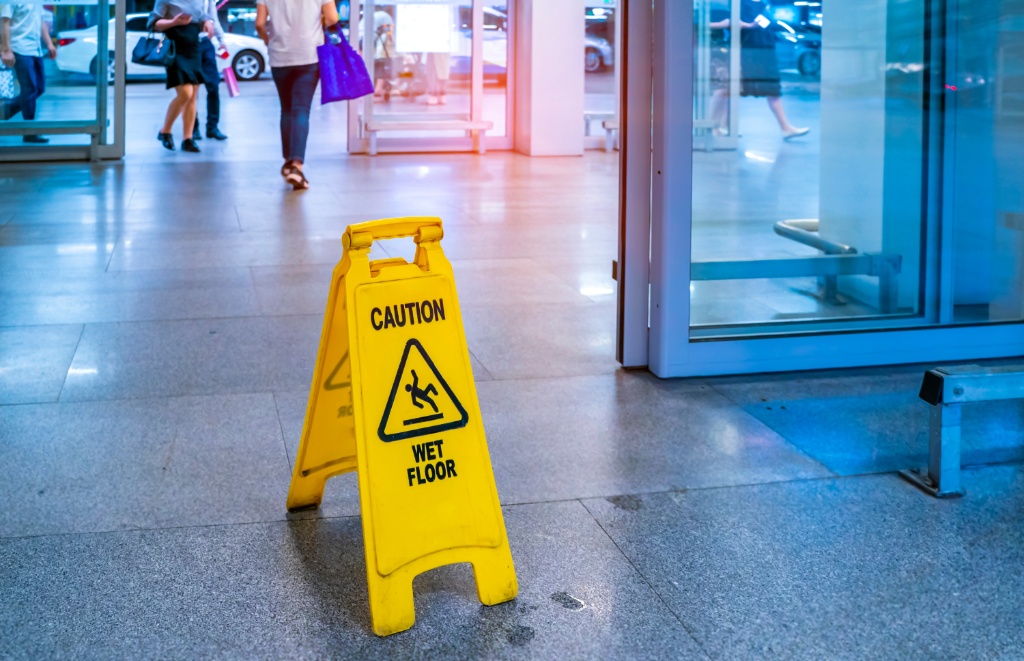March 8, 2018 | slip and fall accident Claims
From the plaintiff’s perspective, what happens throughout a slip and fall claims process?
Table of Contents
In a slip and fall case, everyone has a job to do. Your job is to try and recover from your injuries and return to your normal work and leisure activities. Your doctor’s job is to provide you with the medical care you need to get back to health. And your lawyer’s job is to gather and preserve evidence and pursue the compensation you deserve.
Of course, there’s more to the slip and fall claims process than just that. To help potential clients understand what they can expect when they have a slip and fall claim, we’ve compiled this brief guide to the entire process.
First Stage: Treatment and Investigation
The first stage of a slip and fall case is about gathering information. Your lawyer will investigate who was responsible for your accident to ensure that all insurance companies are put on notice about your claim. He or she will also gather all of the medical information needed to understand your injuries and losses.
With British Columbia slip and fall cases, there are often multiple companies potentially responsible for the accident, including the property owner or manager, the lessee, and the maintenance company. Each of these companies will have its own slip and fall insurance coverage to compensate you for your injuries.
During this first stage, you should be attending your doctor and telling him or her about all of your symptoms and every area affected by pain. If you have trouble sleeping, tell your doctor. If your mood is affected, tell your doctor. If you have numbness or tingling, trouble with concentration or memory, tell your doctor.
If your treatment team does not know about all of your symptoms, then they cannot properly diagnose your injuries or recommend the proper treatment. So, tell them everything.
And follow your doctor’s advice. If your doctor recommends physiotherapy, then make an appointment. If your physiotherapist recommends that you do exercises, then do them. If you have trouble affording physiotherapy or other types of treatment, then talk to your lawyer about funding options.
What Your Lawyer Needs to Know
Clients and lawyers have a special relationship. Your lawyer is your legal advisor. He or she represents and advises you throughout the slip and fall claims process. Everything you tell your lawyer is held in the strictest confidence.
That’s so you can be completely forthright with your lawyer. If you aren’t, then he or she may lack critical information needed to represent you properly and obtain the best outcome for you. You never want your lawyer to be surprised by a part of your case.
Your lawyer should know about all of the injuries or health conditions present before the accident, especially ones that had an impact on your social or work life. Your lawyer should know how you earn income, how much income you earn, and how your injury has impacted your earnings.
Your lawyer should know what injuries you suffered in the accident and how they affect your life. He or she should also know how the accident happened and what evidence you have in this regard, including pictures of the hazard and any identifying or contact information about witnesses.
Second Stage: Negotiation and Settlement
The second stage isn’t really a standalone phase at all: Your case can settle at any time throughout the slip and fall claims process. This often occurs without even having to file a lawsuit, the next stage in the process.
But it is possible to settle a claim too quickly. Although our goal is to settle cases quickly whenever possible, reaching a good settlement requires understanding the full extent of your injuries, which isn’t always immediately apparent.
Some injuries take longer than others to heal: Soft tissue injuries typically reach maximum recovery within two years, and broken bones typically reach maximum recovery within one year.
But broken bones that involve joints (like knee injuries) are particularly serious injuries because they can cause post-traumatic arthritis several years after an accident and lead to significant problems with function and even early retirement. And even soft-tissue damage may cause long-lasting chronic pain.
If you recover quickly from your injuries, then your case can be settled more quickly. If you do not recover quickly, then we must wait until we know how severe your injuries are and how long they will last. A personal injury lawyer’s concern is not with the first six months of your injury, but how an injury will affect you for the remainder of your life.
Many slip and fall cases can be settled without going to court. But for others, particularly those involving more serious injuries, your case will proceed to stage three: filing a lawsuit.
Third Stage: Starting a Lawsuit
The third stage of a slip and fall claim involves starting a formal lawsuit by filing legal documents with the court. Once your claim is filed, your lawyer will exchange relevant documents with the insurance company and their lawyer so they can have information about your injuries and we can learn information about how or whether they caused your accident.
For example, your lawyer will try to secure photographs and measurements of what caused your accident. (But, if possible, it is always best to take pictures yourself immediately after your accident.)
Your lawyer will also request information from the property owner, including maintenance logs showing whether they inspected the accident location and when the most recent inspection was.
There may be an “examination for discovery,” which is a chance for us to interview the people responsible for your accident and for the insurance company lawyer to interview you about the accident and your injuries. Examinations for discovery are not held in a courtroom, but do take place under oath. Your lawyer will prepare you for the discovery to ensure that you are comfortable with the entire process.
Fourth Stage: Mediation
The fourth stage of a case is typically mediation. If you have not already settled your case, then your lawyer will usually recommend a mediation. A mediation is an informal and confidential meeting with the insurance company and a neutral third-party mediator to try and settle your case. Mediation is a useful tool in British Columbia and is usually successful at settling claims.
Fifth Stage: Trial
The last stage of a slip and fall case is the trial. Trials are rare in slip and fall cases. The vast majority of cases settle well before trial. In some circumstances, however, it will be necessary to attend trial to receive fair compensation. The decision to attend trial will always be your own, based on a lawyer’s legal advice.
Trial can be an empowering experience where you can tell the court how your injuries have impacted your life, particularly when you receive a fair verdict awarding you just compensation.
Claims and Defences at Trial
In a slip and fall case, your lawyer must demonstrate two things: (1) that your accident was caused by a failure to keep a property reasonably safe; and (2) that you suffered an injury as a result of your fall. Your lawyer will rely on the evidence obtained from you (such as medical and payroll records) and from the other party during discovery to prove these two elements.
Insurance companies use a variety of tactics to try and minimize the compensation someone receives after an accident. For example, an insurance company may rely on any or all of the following defences:
-
- You didn’t fall. If no one witnessed you falling and there’s no video evidence of it, the insurance company may claim that you’re making it all up.
- The company didn’t cause your fall or injuries. It is important to know what caused your fall. If you do not know what caused your fall, you cannot prove there was a hazard present that the property owner should have removed. Similarly, the insurance company may argue that your injuries pre-existed your fall, and so they shouldn’t have to pay for your treatment.
-
- You’re to blame for your fall. This is known as the defence of contributory negligence. If you were even partially at fault in causing your own injury, such as by not paying attention to your surroundings, your damage award will be reduced.
- You weren’t injured or your injuries weren’t that bad. For example, if your family doctor records do not have notations of your injuries or all of your symptoms, then the insurance company will argue that you were not badly injured—otherwise, your doctor would know more about your injuries.
Experienced Guidance Throughout the Slip and Fall Claims Process
This article only begins to describe the process of pursuing and winning a slip and fall claim. Like all legal claims, that process is complicated, full of sophisticated legal rules and nuanced factual disputes. To be successful, you should hire an experienced personal injury lawyer to represent you.
Preszler Injury Lawyers is a British Columbia personal injury firm with offices throughout the province. We help guide our clients throughout the process of making slip and fall and other injury claims. Contact us today for a free consultation to learn how we can help you with your case.
Written by Raj Bhogal
Personal Injury Lawyer
Lawyer Raj Bhogal handles a variety of complex personal injury claims, including institutional abuse cases, long-term disability disputes, aviation-related injuries, premises liability, and more.
More slip and fall accident Topics
Here’s more information on slip and fall accident related topics that we think you might find helpful.

slip and fall accident
|
February 8, 2020
How Long Do I Have to File a Slip and Fall Lawsuit?
There are important deadlines for every type of legal claim. Injury claims involving slip and fall accidents are no exception. If you have sustained an…

slip and fall accident
|
January 6, 2020
How Much is My Slip and Fall Case Worth?
If you suffer an injury in a slip and fall in British Columbia, you may be wondering how much your claim is worth. Unfortunately, there…

slip and fall accident
|
March 8, 2018
British Columbia Slip and Fall Basics
According to the Canadian Institute for Health Information, falls are the number one cause of injuries leading to hospitalization in Canada. Often, these falls are caused…
Speak With Our
Legal Team for FREE
Find Out if You Have a Case in Under 5 Minutes
Speak to a Lawyer Now!
We’re here to help.
